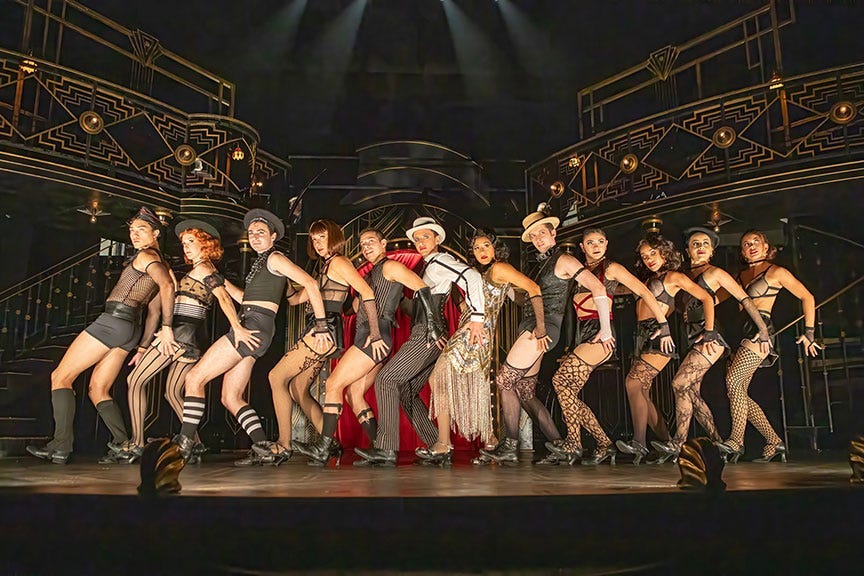“So… Life is… Disappointing. Ja? Forget it! We have no troubles here. For here… life is beautiful.” — Emcee, Cabaret
Over the past year, I’ve been extremely fortunate to experience what I consider to be the greatest musical of all time: Cabaret . Specifically, the 2021 West End revival and its 2024 Broadway transfer, directed by Rebecca Frecknall. Between the immersive pre-show, world-class performances, and lush production design, it’s a theatergoer’s dream. But none of that softens the blow of the show’s central warning — a warning that feels increasingly urgent for queer people in America today.
If it wasn’t already abundantly clear, this article will contain a stupendous amount of spoilers for Cabaret (more specifically the 2021 West End Revival and the 2024 Broadway Revival). I cannot implore you enough to find a way to experience this production, whether in person or through… other means . But I promise, even knowing the plot won’t dull the emotional impact. This show sneaks up on you. Every time.
What is Cabaret
Cabaret premiered on Broadway on November 20, 1966, with a book by Joe Masteroff and music and lyrics by the legendary team of John Kander and Fred Ebb. From the beginning, it held a mirror up to the audience — literally and figuratively — inviting them to examine how complacency and indifference can open the door to fascism. Set in Berlin as the Nazi party rises to power, it centers on the Kit Kat Klub, a hedonistic nightclub where politics are ignored until they become impossible to escape. Characters like Sally Bowles and Herr Schultz dismiss the growing threat until it’s too late. The show’s message: not taking a stand is a stand in itself.
A Perfectly Marvelous Safe Haven
What is special about this current production of Cabaret is the focus on how the club represents a queer safe haven. This is shown clearly through simple choices from makeup designs to having non-binary and trans performers playing the Kit Kat Boys and Girls. All of the scenes within the club are, for lack of better phrasing, a bop! The songs are amazing, the choreography is electric, and the costumes are breathtaking — all while the world outside the club is falling to oppressive regimes. This duality shows blatantly that the Kit Kat Club is a safe haven for all people, while the outside world is dangerous and oppressive. Without a doubt, this resonates strongly with America in recent history. Places such as California, Seattle, and NYC are all well known as LGBTQIA+ friendly locations that embrace — and celebrate — their culture. But these safe havens, just as seen in Act Two of Cabaret, may not be as safe as they appear.
So What?
According to the ACLU, the places that I previously listed as examples as safe havens are all taking anti-LGBTQ measures as I write. California is currently working on 6 anti-LGBTQ bills, and Washington and New York both are working on 4 anti-LGBTQ bills. Nationwide, the statistic looks even more concerning, with 506 anti-LGBTQ bills being presented in some form in 2025. These “safe havens” are being taken away through legislation across the nation, and this is not a new issue.
And this is not new. Consider the Stonewall Inn. In 1969, it was one of the few openly gay bars in NYC — a true refuge. But on June 28 of that year, it was raided by police targeting trans patrons and drag performers. That night sparked the Stonewall Riots, a defiant, often violent stand against systemic brutality. It’s an iconic chapter in LGBTQ history — and a reminder that when safe spaces are stripped away, marginalized communities fight back.
Now is a good time to clarify — this paper is in no way endorsing violence of any kind. The Stonewall Riots were a brave, resilient uprising against social liberties being taken away — but ultimately it was a violent protest leading to numerous injuries on both the police and protesters side. This paper is, however, endorsing taking a stand (more on that later).
Why Should I Wake Up
In Cabaret , Act II marks a turning point. The Nazi regime’s influence begins to infect the club. Herr Schultz, a Jewish fruit vendor, insists: “I understand the Germans. For what am I, but a German?” His faith in assimilation — his denial of danger — is heartbreaking. As the act progresses, the glitz of the Kit Kat Klub fades. Performers return stripped of makeup, dressed identically. The vibrant haven has collapsed into conformity and fear.
Nobody fought back. Nobody stopped it. Sound familiar?
What Would You Do?
It’s not hopeless. Far from it. We can fight the erosion of queer safety with action — measured, legal, united action. Here’s how:
Email your local representatives and demand they oppose anti-LGBTQ
legislation.
Attend peaceful protests and public forums.
Speak up — in your community, on social media, and in spaces of privilege.
Stay informed and cite facts. Disinformation is the enemy of progress.
We can protect our sanctuaries. We can keep life beautiful. But we must not wait until the world outside crashes down on us. As the Emcee says, “In here, life is beautiful.” And if we act now — together — it can stay that way.





